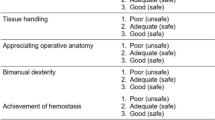Abstract
Background
The McGill Inanimate System for Training and Evaluation of Laparoscopic Skills (MISTELS) is a series of five tasks with an objective scoring system. The purpose of this study was to estimate the interrater and test–retest reliability of the MISTELS metrics and to assess their internal consistency.
Methods
To determine interrater reliability, two trained observers scored 10 subjects, either live or on tape. Test–retest reliability was assessed by having 12 subjects perform two tests, the second immediately following the first. Interrater and test–retest reliability were assessed using intraclass correlation coefficients. Internal consistency between tasks was estimated using Cronbach’s alpha.
Results
The interrater and test–retest reliabilities for the total scores were both excellent at 0.998 [95% confidence interval (CI), 0.985–1.00] and 0.892 (95% CI, 0.665–0.968), respectively. Cronbach’s alpha for the first assessment of the test–retest was 0.86.
Conclusions
The MISTELS metrics have excellent reliability, which exceeds the threshold level of 0.8 required for high-stakes evaluations. These findings support the use of MISTELS for evaluation in many different settings, including residency training programs.
Similar content being viewed by others
References
American Psychological Association (1985) Standards for educational and psychological testing. American Psychological Association, Washington, DC
Bland JM, Altman DG (1997) Cronbach’s alpha. Br Med J 314: 572
Cronbach L (1951) Coefficient alpha and the internal structure of tests. Psychometrika 16: 297–302
Derossis AM, Antoniuk M, Fried GM (1999) Evaluation of laparoscopic skills: a 2-year follow-up during residency training. Can J Surg 42: 293–296
Derossis AM, Bothwell J, Sigman HH, Fried GM (1998) The effect of practice on performance in a laparoscopic simulator. Surg Endosc 12: 1117–1120
Derossis AM, Fried GM, Abrahamowicz M, Sigman HH, Barkun JS, Meakins JL (1998) Development of a model for training and evaluation of laparoscopic skills. Am J Surg 175: 482–487
Fraser SA, Klassen DR, Feldman LS, Ghitulescu GA, Stanbridge D, Fried GM (2003) Evaluating laparoscopic skills: setting the pass/fail score for the MISTELS system. Surg Endosc 17: 964–967
Fried GM, Derossis AM, Bothwell J, Sigman HH (1999) Comparison of laparoscopic performance in vivo with performance measured in a laparoscopic simulator. Surg Endosc 13: 1077–1082
Gall M, Borg W, Gall J (1996) Educational research: an introduction. Longman, White Plains, NY
Hanna GB, Drew T, Clinch P, Hunter B, Cuschieri A (1998) Computer-controlled endoscopic performance assessment system. Surg Endosc 12: 997–1000
Reznick R, Regehr G, MacRae H, Martin J, McCulloch W (1997) Testing technical skill via an innovative “bench station” examination. Am J Surg 173: 226–230
Rosser JC, Rosser LE, Savalgi RS (1997) Skill acquisition and assessment for laparoscopic surgery. Arch Surg 132: 200–204
Shrout P, Fleiss J (1979) Intraclass correlations: uses in assessing rater reliability. Psych Bull 86: 420–428
Streiner D, Norman G (1996) Health measurement scales: a practical guide to their development and use. Oxford University Press, New York
Acknowledgments
This work was funded by an unrestricted educational grant from Tyco Healthcare Canada.
Author information
Authors and Affiliations
Corresponding author
Additional information
Poster presented in part as at the annual meeting of the Society of American Gastrointestinal Endoscopic Surgeons (SAGES), Denver, Colorado, USA March 2004
Rights and permissions
About this article
Cite this article
Vassiliou, M.C., Ghitulescu, G.A., Feldman, L.S. et al. The MISTELS program to measure technical skill in laparoscopic surgery. Surg Endosc 20, 744–747 (2006). https://doi.org/10.1007/s00464-005-3008-y
Received:
Accepted:
Published:
Issue Date:
DOI: https://doi.org/10.1007/s00464-005-3008-y




